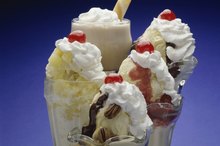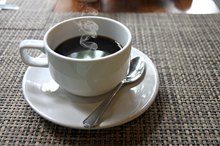Can Caffeine Cause Leg Cramps at Night?
Caffeine is a drug found naturally in tea and coffee that stimulates the nervous system and can lead to feeling anxious and irritable. In 2000, experts linked caffeine to joint diseases, and people who consume more than 400 mg a day are at risk of painful withdrawal symptoms. More than half of adults between 25 and 39 get their caffeine fix daily from coffee, according to the National Coffee Association. In 2006, Americans spent $2 billion on tea, says the Tea Association.
Rheumatoid Arthritis
The number of cups of coffee a person drinks each day might be directly proportional to the risk for developing rheumatoid arthritis, or RA. Researchers from Finland’s National Public Health Institute evaluated the health effects of coffee consumption and its association to RA. Drinking four or more cups of coffee a day seems to be the threshold for determining the likelihood of developing the condition. It is not known what role caffeine plays. Rheumatoid arthritis is a debilitating joint-inflammation disorder. Chronic, severe leg pain is just one component of this chronic disease. Night pain in people with RA is a characteristic of a more active disease, according to a 1998 study published in the journal “Annals of Rheumatoid Diseases.”
- The number of cups of coffee a person drinks each day might be directly proportional to the risk for developing rheumatoid arthritis, or RA.
- Night pain in people with RA is a characteristic of a more active disease, according to a 1998 study published in the journal “Annals of Rheumatoid Diseases.”
Restless Legs Syndrome
Why Does Caffeine Give Me a Headache?
Learn More
Caffeine has been linked to restless legs syndrome, RLS, a condition that causes pain and discomfort in the legs, especially at night. The National Institute of Neurological Disorders and Stroke suggests cutting back on caffeine to reduce symptoms in people with mild to moderate RLS. Common characteristics of RLS include symptoms occurring while inactive, such as when sufferers are trying to go to sleep, worsening pain in the evening and nighttime leg twitching.
Withdrawal
While it might not be as serious as other kinds of withdrawal, caffeine withdrawal is a very real phenomenon and one some experts would like to see classified as a psychiatric disorder, according to CBS News Healthwatch. Symptoms of caffeine withdrawal include muscle pain and stiffness and occur about 12 to 24 hours after the last cup of joe or other caffeine-infused beverage. If your last cup of coffee was 10 a.m. and you go the rest of the day without a fix, it would make sense for cramps to kick in at night. Few people drink enough coffee to experience withdrawal symptoms, however. MayoClinic.com reports that drinking more than four cups a day could put you at risk.
- While it might not be as serious as other kinds of withdrawal, caffeine withdrawal is a very real phenomenon and one some experts would like to see classified as a psychiatric disorder, according to CBS News Healthwatch.
Considerations
Caffeine & Back Pain
Learn More
Consuming from 200 to 300 mg of caffeine a day, equivalent to two to four cups of coffee, shouldn’t be harmful, according to MayoClinic.com. Heavy caffeine use -- more than 500 mg a day -- can cause insomnia, irritability and muscle tremors. If you don’t want to cut down on caffeine, try drinking tea, which has much less caffeine than coffee. Generic, instant tea mix contains about 27 g of the chemical. Many sports drinks, on the other hand, can have more caffeine than coffee, ranging from 74 mg to nearly 300 mg in an 8.4 oz. serving. Most soft drinks contain about 30 to 55 mg. Note that by taking a medication like Exedrin or certain types of Tylenol, you could be popping more than 100 mg of caffeine.
- Consuming from 200 to 300 mg of caffeine a day, equivalent to two to four cups of coffee, shouldn’t be harmful, according to MayoClinic.com.
Related Articles
References
- "USAToday"; Tea is Steeped in Health Benefits; October 2007
- Lakartidningen; Is Caffeine Addictive?; JW Daly; December 1998
- "Annals of the Rheumatic Diseases"; Coffee Consumption, Rheumatoid Factor, and the Risk of Rheumatoid Arthritis; 2000
- “Annals of Rheumatoid Diseases”; Day and Night Pain Measurement in Rheumatoid Arthritis; B. Rojkovich; July 1998
- Coffee, brewed, prepared with tap water. FoodData Central. U.S. Department of Agriculture. Published April 1, 2019.
- Caffiene in coffee. FoodData Central. U.S. Department of Agriculture. Published April 1, 2019.
- McCusker RR, Fuehrlein B, Goldberger BA, Gold MS, Cone EJ. Caffeine content of decaffeinated coffee. J Anal Toxicol. 2006;30(8):611-3. doi:10.1093/jat/30.8.611
- Coffee, instant, reconstituted. FoodData Central. U.S. Department of Agriculture. Published April 1, 2019.
- U.S. Department of Agriculture. Coffee, espresso. FoodData Central. Published April 1, 2019.
- Tea, hot, leaf, black. FoodData Central. U.S. Department of Agriculture. Published April 1, 2019.
- Soft drink, cola. FoodData Central. U.S. Department of Agriculture. Published April 1, 2019.
- US Food & Drug Administration. Spilling the beans: How much caffeine is too much?. Updated December 12, 2018.
- Rogers PJ, Heatherley SV, Mullings EL, Smith JE. Faster but not smarter: Effects of caffeine and caffeine withdrawal on alertness and performance. Psychopharmacology (Berl). 2013;226(2):229-40. doi:10.1007/s00213-012-2889-4
- Freedman ND, Park Y, Abnet CC, Hollenbeck AR, Sinha R. Association of coffee drinking with total and cause-specific mortality. N Engl J Med. 2012;366(20):1891-904. doi:10.1056/NEJMoa1112010
- Voskoboinik A, Kalman JM, Kistler PM. Caffeine and arrhythmias: Time to grind the data. JACC Clin Electrophysiol. 2018;4(4):425-432. doi:10.1016/j.jacep.2018.01.012
- Papakonstantinou E, Kechribari I, Sotirakoglou Κ, et al. Acute effects of coffee consumption on self-reported gastrointestinal symptoms, blood pressure and stress indices in healthy individuals. Nutr J. 2016;15:26. doi:10.1186/s12937-016-0146-0
- The American College of Obstetricians and Gynecologists. Moderate Caffeine Consumption During Pregnancy. Committee Opinion: 462. Published August 2010.
- Drake C, Roehrs T, Shambroom J, Roth T. Caffeine effects on sleep taken 0, 3, or 6 hours before going to bed. J Clin Sleep Med. 2013;9(11):1195-200. doi:10.5664/jcsm.3170
- Alstadhaug KB, Andreou AP. Caffeine and primary (migraine) headaches-friend or foe?. Front Neurol. 2019;10:1275. doi:10.3389/fneur.2019.01275
- Lara DR. Caffeine, mental health, and psychiatric disorders. J Alzheimers Dis. 2010;20 Suppl 1:S239-48. doi:10.3233/jad-2010-1378
- National Institute of Diabetes and Digestive and Kidney Diseases. Eating, diet and nutrition for GER and GERD. Updated November 2014.
- Jiwani AZ, Rhee DJ, Brauner SC, et al. Effects of caffeinated coffee consumption on intraocular pressure, ocular perfusion pressure, and ocular pulse amplitude: A randomized controlled trial. Eye (Lond). 2012;26(8):1122-30. doi:10.1038/eye.2012.113
- Mitchell DC, Knight CA, Hockenberry J, Teplansky R, Hartman TJ. Beverage caffeine intakes in the U.S. Food Chem Toxicol. 2014;63:136-42. doi:10.1016/j.fct.2013.10.042
Writer Bio
Shannon Marks started her journalism career in 1994. She was a reporter at the "Beachcomber" in Rehoboth Beach, Del., and contributed to "Philadelphia Weekly." Marks also served as a research editor, reporter and contributing writer at lifestyle, travel and entertainment magazines in New York City. She holds a Bachelor of Arts in literature from Temple University.









